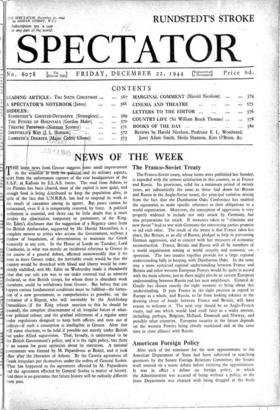,--' 1 4 194 N E WS OF THE WEEK HE latest
news from Greece suggests tome small improvement in the ;in.ilZilitirlsottr-its-palitical and its military aspects,
apart from the unfortunate capture of the rear headquarters of the e R.A.F. at Kafissia by E.L.A.S. forces. The road from Athens to the Piraeus has been cleared, most of the capital is now quiet, and [, enough food is being distributed to keep the population alive, in spite of the fact that U.N.R.R.A. has had to suspend its work as
the result of casualties among its agents. But peace cannot be
maintained, even if it is temporarily restored, by force. A political
settlement is essential, and there can be little doubt that it must involve the elimination, temporary or permanent, of the King. Mr. Eden's disclosure that the suggestion of a Regency came from the British Ambassador, supported by Mr. Harold Macmillan, is a complete answer to critics who accuse the Government, without a shadow of foundation, of determination to maintain the Greek monarchy at any cost. In the House of Lords on Tuesday, Lord C anborne, in what was merely an incidental reference to Greece in the course of a general debate, affirmed unanswerably that if we were to leave Greece today, the inevitable result would be that the country would be drenched with blood and liberty would be com- pletely stultified, and Mr. Eden on Wednesday made it abundantly clear that our sole aim was to see order restored and an amnesty declared, so that British troops, for whom there is abundant work elsewhere, could be withdrawn from Greece. But before that can happen certain fundamental conditions must be fulfilled—the forma- tion of a new government, as comprehensive as possible, on the invitation of a Regent, who will inevitably be the Archbishop Damaskinos (if the King refuses sanction to this he should be ignored), the complete disarmament of all irregular forces of what- ever political colour, and the gradual enlistment of a regular army under regulations designed to keep both officers and men out of politics—if such a conception is intelligible in Greece. After that will come elections, to be held if possible not merely under British but under Allied supervision. That, broadly, is understood to be the British Government's policy, and it is the right policy, but there is no reason for great optimism about its execution. A national government was formed by M. Papandreou at Beirut, and it took office after the liberation of Athens. By the Caserta agreement all Greek irregulars put themselves under the orders of General Scobie.
at has happened to the agreement effected by M. Papandreou rid the agreement effected by General Scobie is matter of history.
there is no guarantee that future history will be radically different om past.


























